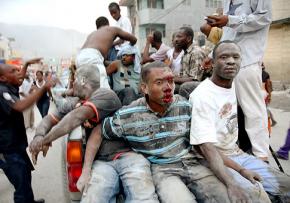Where is the aid in Haiti?
, a coordinator of the Canada Haiti Action Network, reports on the desperate conditions in Haiti and the failure of governments like the U.S. to respond.
EVIDENCE OF monstrous neglect of the Haitian people is mounting following the catastrophic earthquake on January 12. As life-saving medical supplies, food, water purification chemicals and vehicles pile up at the airport in Port-au-Prince, and as news networks report a massive international effort to deliver emergency aid, people in the shattered city are wondering when they will see help.
As of January 15, the BBC World Service reported that Haitian officials now fear the death toll could rise to 140,000. Three million people are homeless.
BBC reporter Andy Gallagher said that he had traveled "extensively" in Port-au-Prince during the day and saw little sign of aid delivery. He said he was shown nothing but courtesy by the Haitians he encountered. Everywhere he went, he was taken by residents to see what had happened to their neighborhood, their homes and their lives. Then they asked, "Where is the help?"
"When the rescue teams arrive," Gallagher said, "they will be welcomed with open arms."

Canadian Broadcasting Corporation Radio One's As It Happens broadcast an interview on January 15 with a spokesperson for the International Committee of the Red Cross. He said he spent the morning touring one of the hardest hit areas of the city (the district was not named), in the hills that rise from the flat plain on which sits historic Port-au-Prince. "In three hours, I didn't see a single rescue team," the spokesperson said.
The BBC report contrasts starkly with warnings of looting and violence that fill the airwaves of news channels such as CNN and that were voiced by U.S. Defense Secretary Robert Gates. He was asked by the media in Washington why relief supplies were not being delivered by air and answered, "It seems to me that air drops will simply lead to riots."
Gates says that "security" concerns are impeding the delivery of aid. But Gallagher responded directly to that in his report, saying, "I'm not experiencing that." Describing the airport, Gallagher reported, "There are plenty of materials on the ground and plenty of people there. I don't know what the problem is with delivery."
Nan Buzard, a spokesperson for the American Red Cross, was interviewed on the same BBC broadcast about the problem with aid delivery. She implied that there were not, in fact, many supplies at the airport to be moved--that many of the planes that have been landing were filled with people, not supplies.
When pressed by the BBC host about why aid was not being moved into the city, Buzard conceded she was "surprised" that it was not being airlifted in.
THE BBC's is not the only report to contradict exaggerated security concerns. The daily report on the Web site of Doctors Without Borders/Médecins Sans Frontières (MSF) one day after the earthquake said, "Some parts of the city are without electricity, and people have gathered outside, lighting fires in the street, and trying to help and comfort each other. When they saw that I was from MSF, they were asking for help, particularly to treat their wounded. There was strong solidarity among people in the streets."
An e-mailed report received by the Canada Haiti Action Network describes a city largely bereft of international aid:
Thus far, the rescue teams cluster at the high-profile and safer walled sites and were literally afraid to enter the barrios. They gravitated to the sites where they had secure compounds and big buildings.
Meanwhile, the neighborhoods where the damage appears to be much wider, and anywhere there were loose crowds, they avoided. In the large sites, and in the nice neighborhoods, and where the press can be found, there would be teams from every country imaginable. Dogs and extraction units with more arriving, yet with 90 percent or more of them just sitting around."
Meanwhile, in the poor neighborhoods, awash in rubble, there was not a foreigner in sight.
News crews are looking for the story of desperate Haitians who are in hysterics. When in reality, it is more often the Haitians who are acting calmly while the international community, the elite and politicians have melted down over the issue, and none seem to have the remotest idea what is going on.
The report says that most of the staff of the U.S. embassy and U.S. Agency for International Development complex (located a stone's throw from the oceanfront) have fled, and buildings are largely empty, even though the streets in the area are clear.
Yesterday, BBC broadcast an interview with Mark Stuart, a director of an orphanage in Jacmel, a city of 50,000 on Haiti's south coast, 50 kilometers south of Port-au-Prince. Aerial footage showed catastrophic damage. Stuart appealed for international relief, saying that food and water supplies would soon run out, and no aid whatsoever had arrived.
An article on the Web site of a Chicago publication says a trickle of aid arrived today, but the road between Port and Prince and Jacmel is impassable.
Aid authorities must be urged to speed up their efforts to flood the earthquake zone with food, water, supplies and medical personnel. A network of relief centers fanning out from the port and airport, including airlifts and parachute drops, would seem an obvious step. Donations to relief efforts, especially to those already delivering services such as Partners in Health and Doctors Without Borders, are crucially important.


